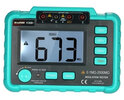Hey all, I have an electrical issue with my own house. I had a dishwasher stop working and Hotpoint sent a guy out to repair, he refused to repair saying all kitchen sockets failed ELR test, details below:
Pre-Intervention Checks:
Earth Loop Impedance: 999
Earth Continuity: 0.01
Insulation: 113
Now I had a kitchen fitted about 2 years ago, the fitter also replaced a couple of sockets that were on view from old plastic white ones to chrome front plates. One of these were behind the bins that was never actually used since due to being in an awkward spot. I bought a basic socket checker and discovered that socket was wired the wrong way, live and neutral were reversed. I have rewired it myself and now it is giving three green lights. I'm shocked (thankfully not literally) that he could have done that as it is clearly marked L and N, but the house didn't burn down so I've that to be thankful for.
Getting to my point, would that have likely been the issue to cause the ELR test failure or is that unrelated, there is a callout fee for the Hotpoint repair man so I don't want to bring him back if that would not possibly be the issue? Thanks!
Pre-Intervention Checks:
Earth Loop Impedance: 999
Earth Continuity: 0.01
Insulation: 113
Now I had a kitchen fitted about 2 years ago, the fitter also replaced a couple of sockets that were on view from old plastic white ones to chrome front plates. One of these were behind the bins that was never actually used since due to being in an awkward spot. I bought a basic socket checker and discovered that socket was wired the wrong way, live and neutral were reversed. I have rewired it myself and now it is giving three green lights. I'm shocked (thankfully not literally) that he could have done that as it is clearly marked L and N, but the house didn't burn down so I've that to be thankful for.
Getting to my point, would that have likely been the issue to cause the ELR test failure or is that unrelated, there is a callout fee for the Hotpoint repair man so I don't want to bring him back if that would not possibly be the issue? Thanks!



